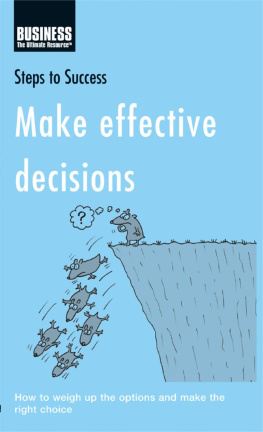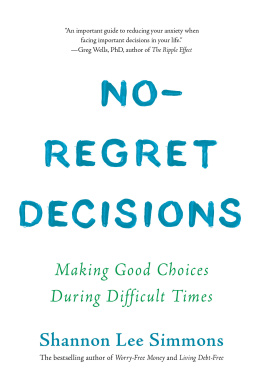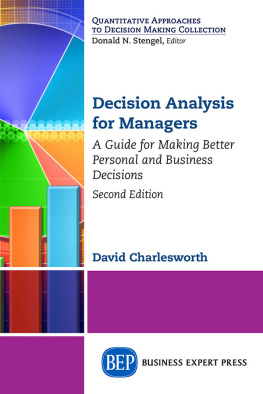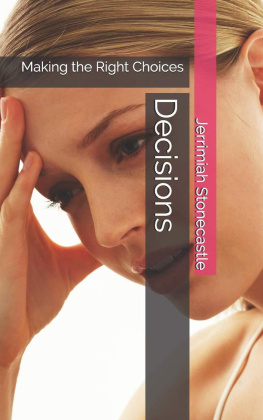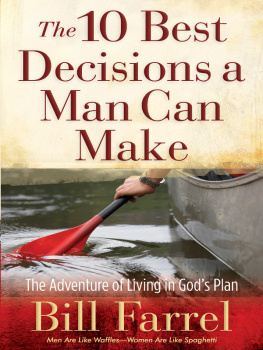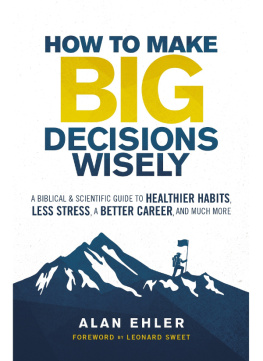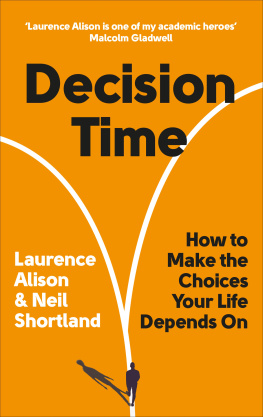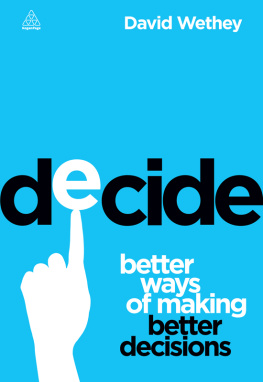Effective Decision-Making
How to Make Better Decisions Under Uncertainty and Pressure
Edoardo Binda Zane
Table of Contents
About this book
The aim of this book is to quickly empower you to make better decisions by giving you step-by-step explanations of the best techniques.
We always make decisions under uncertainty and pressure, especially in business. We need faster and better decisions to cope, but we dont have the time to learn how to make them well. That is where I come in. I wrote this book to allow you to make better decisions without spending weeks studying theory and practice.
My aim is to be understandable and practical. As a result, this book is written in colloquial language and it is a lot less academic and solemn than other ones.
So, if you are looking for academically complete, 100-page long and in-depth methodologies for each tool and method, then this book is not for you.
On the other hand, if you need practical and valid tools to apply on the spot, I suggest you keep on reading.
Chapter overview
The introduction gives you a snapshot of two massively important biases and of the worst mistake you can do when making a decision, as well as a lesson taken straight from philosophy.
The first chapter looks at frameworks of reference, meaning how you can apply decision making in your business environment to achieve specific goals, for example how and why a decision is able to automatically give you an advantage over your direct competitor.
Chapters 2 to 5 look at separate phases of decision making, starting from your environment and your problem, then moving on to generating solutions and selecting the most relevant ones.
Chapters 6 and 7 are devoted to group decision making, as how you can tell whether its a good idea to involve your team in a decision and, if it is, how you should involve them.
The last two chapters refer to more specific aspects: corporate strategy design and analysis of consequences / impact.
Introduction
A brief take on your brain messing with you
Your brain isnt necessarily your friend in the decision process. And the worst part? You may not even be aware of it. Researchers have been studying these phenomena called biases for the past few decades. In a nutshell, these are processes which your brain enters while processing information and which make it almost impossible for you to be 100% objective. The list of cognitive biases is long and keeps on growing every year. Several of them deal with decision making, with our beliefs, judgments and behaviour.
Out of the whole list, there are two which I want to show you to answer to your question: why do I actually need a book to show me how to decide.
You want your decision to be the right one (the confirmation bias)
You know the confirmation bias as being in love with a solution from the start. Under a confirmation bias, given a set of pieces of information, you tend to select or favour only the ones that support your decision, while deliberately obscuring all the ones that may contradict your belief or support an alternative solution, regardless of their validity, (Nickerson, 1998). What is even worse, sometimes you still hold your belief as true even after you are presented with irrefutable evidence that you are wrong.
Taking a couple of extreme examples (and simplifying the issues to avoid entering a whole different topic), this is at the root of several heated debates, such as climate change (real/hoax) or homeopathy (it works/it doesnt). Despite overwhelming scientific evidence favouring one thesis, whoever is convinced of the opposite one systematically disregards or lowers the validity of that evidence, or is only willing to consider evidence that supports his or her thesis.
Move back to everyday life, it has surely happened that you have been party to this type of discussion, and you must have noticed how difficult it is to have someone move away from his position despite the validity of your arguments. In a nutshell, this is the confirmation bias in action, and avoiding it can be extremely difficult, even if you are aware of it. Speaking of which, what confirmation biases are YOU holding?
You know that you dont know (the Dunning-Kruger effect)
Ever been in a meeting where someone who is irrefutably an idiot doesnt move from his position and refuses to listen to you although you know much better than him? Part of it is Confirmation Bias; part of it is this persons perception of himself.
In other words, unskilled people tend to overestimate their abilities, and skilled people tend to underestimate them. This is the basic concept of the Dunning-Kruger effect (Dunning, Kruger, 1999).
This often happens in meetings with devastating effects. Especially when the unskilled one occupies a position of power and is the one ultimately making a decision. Sum this effect to a confirmation bias and you can be sure that the meeting is doomed.
Unfortunately, this effect also plays a role when you are deciding on your own. I trust that you are skilled in what you do, but precisely because of it you will be a victim of this effect: you will start overthinking and will start questioning your ability to pull through with your plan. Im not saying you should be free of doubt. Having doubts is healthy and helps you focus but if you regularly believe you dont know enough, then the Dunning-Kruger effect is probably taking you down.
On top of that, the skills and expertise needed to recognize superior and inferior performance are exactly the same skills and expertise needed to produce a superior performance (Highhouse et al., 2014).
In other words, you would notice if you are doing the right thing or the wrong one only if you are competent. If you are not, though, you will tend to think that your decision is the right one, and the more you lack competence, the more strongly you will believe in what you do.
Aware as you might be of these two biases or of any other one, it is almost impossible to free yourself from their effect. This means that your objective judgement will always be, to a certain extent, clouded by some subjective effect. Throughout the rest of this book, well go through a number of tools that can help you to limit the effect of these biases, in different stages of your decision.
Before we get into that, though, there is one last issue we need to cover: making sure you dont commit the most common and fatal mistake in making a decision, especially when it comes to your job.
The biggest mistake in making decisions
Brainstorming.
Brainstorming is possibly the most used, overrated and harmful decision making technique of all times. Brainstorming groups are significantly less productive than nominal groups, in terms of both quantity and quality. (Mullen, Johnson, Salas 1991) in other words a group of people generating ideas individually and then discussing them, produces more and better ideas than the same group generating ideas together and then discussing them.
Before digging into the reasons, lets take a look at how a proper brainstorming session should work.
- You decide on a topic (for example a problem that needs solved);
- You choose a recorder, someone that will only write down what is being said;
- You have your team sit in a room and voice out ideas linked to the topic, without stopping or commenting on what is being said.
- Once that part is over (either there are no more ideas being thrown in or you had decided for a set amount of time), the recorder can group ideas and moderate a discussion about what has been said.
- Either the group reaches an agreement, or a report with options is produced and re-analysed at a later stage, or management selects one option.
Next page

